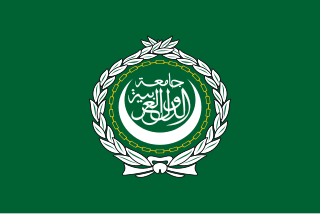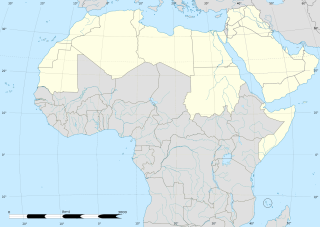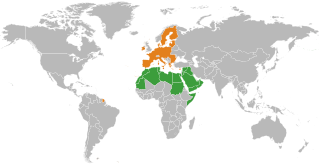
The Arab League, formally the League of Arab States, is a regional organization in the Arab world, which is located in Northern Africa, Western Africa, Eastern Africa, and Western Asia. The Arab League was formed in Cairo on 22 March 1945 initially with six members: Egypt, Iraq, Transjordan, Lebanon, Saudi Arabia, and Syria. Yemen joined as a member on 5 May 1945. Currently, the League has 22 members, but Syria's participation has been suspended since November 2011.

The Arab world, formally the Arab homeland, also known as the Arab nation, the Arabsphere, or the Arab states, consists of the 22 Arab countries which are members of the Arab League. A majority of these countries are located in Western Asia, Northern Africa, Western Africa, and Eastern Africa. The region stretches from the Atlantic Ocean in the west to the Arabian Sea in the east, and from the Mediterranean Sea in the north to the Indian Ocean in the southeast. The eastern part of the Arab world is known as the Mashriq, and the western part as the Maghreb. Arabic is used as the lingua franca throughout the Arab world.
The Arab League was formed in Cairo on 22 March 1945 with six members: Egypt, Iraq, Transjordan, Lebanon, Saudi Arabia, and Syria. Yemen joined on 5 May 1945. Since its formation the Arab League has promoted the Palestinian Arab cause in the Israeli–Palestinian conflict, including by imposing the Arab League boycott of Israel. The Arab League opposed the United Nations Partition Plan for Palestine in 1947. On 15 May 1948, the then seven Arab League members coordinated an invasion of what was by then the former British Mandate, marking the start of the 1948 Arab–Israeli War.

The Council of Arab Economic Unity (CAEU) was founded by Egypt, Iraq, Jordan, Kuwait, Libya, Mauritania, Palestine, Saudi Arabia, Sudan, Tunisia, Syria, United Arab Emirates and Yemen on May 30, 1964, following an agreement in 1957 by the Economic Council of the Arab League.
The European Union-Mediterranean Free Trade Area, also called the Euro-Mediterranean Free Trade Area or Euromed FTA, is based on the Barcelona Process and European Neighbourhood Policy (ENP). The Barcelona Process, developed after the Barcelona Conference in successive annual meetings, is a set of goals designed to lead to a free trade area in the Mediterranean Region and the Middle East by 2010.

The Arab Fund for Economic and Social Development (AFESD) is a Kuwait-based pan-Arab development finance institution. All member-states of the Arab League are members of the AFESD. As of 2003, it held around US$7.3 billion in assets.
The Arab Union is a theoretical political union of the Arab states. The term was first used when the British Empire promised the Arabs a united independent state in return for revolting against the Ottoman Empire, with whom Britain was at war. It never came to fruition following the Sykes–Picot Agreement. Despite this, many in the Arab world have since called for the creation of a pan-Arab state. Egyptian President Gamal Abdel Nasser made several unsuccessful attempts to unite Egypt with other Arab countries, and briefly succeeded in forming the United Arab Republic with Syria in 1958, which dissolved in 1971. Similar attempts were made by other Arab leaders, such as Hafez al-Assad, Ahmed Hassan al-Bakr, Faisal I of Iraq, Muammar Gaddafi, Saddam Hussein, Gaafar Nimeiry and Anwar Sadat.

The Arab Monetary Fund (AMF) is a regional Arab organization, a working sub-organization of the Arab League. It was founded 1976, and has been operational since 1977.

The Arab League or League of Arab States was founded by Egyptian in 1945, has 21`* members and five observer members so far: Armenia, Brazil, Eritrea, Republic of India, and Venezuela.
The economy of the Arab League is the economy of the member states of the Arab League. The economy is primarily dependent on exports of oil and natural gas; in recent years however, tourism has grown rapidly, becoming the fastest growing sector in the region.

The Headwater Diversion Plan was an Arab League plan to divert two of the three sources of the Jordan River, and prevent them from flowing into the Sea of Galilee, in order to thwart Israel's plans to use the water of the Hasbani and Banias in its National Water Carrier project for out-of-Basin irrigation. The plan was approved by the Arab League in 1964 but Israel prevented the project's development by conducting airstrikes in Syrian territory in April 1967.

Russia–Arab League relations include various contacts between the Russian Federation and the multi-state Arab organization. The Russian Federation maintains various contacts with the Arab League and plays a mediating role in the Israeli–Palestinian conflict.

Morocco-Egypt relations refers to the bilateral relations between the kingdom of Morocco and the Arab Republic of Egypt. Since independence, the two nations have maintained warm relations. Both countries are members of the Arab League, GAFTA, WTO, the Non-Aligned Movement, the Organisation of Islamic Cooperation, the Council of Arab Economic Unity and the UN.

The Arab Customs Union is a customs union announced at the Arab League's 2009 Arab Economic and Social Development Summit in Kuwait in order to achieve a functional customs union by 2015 and an Arab common market by 2020 and to increase inter-Arab trade and integration.

The 1964 Arab League summit in Alexandria was held on 11 September 1964 in Montaza Palace, Alexandria as the second Arab League Summit. The focus of the conference was to implement the plans discussed at the first Arab League summit held in January of that year. The summit was notable for being a key step in the buildup to the Six-Day War in 1967 and separately for "approving the establishment of the Palestine Liberation Organization."

The Arab League and European Union have shared relations since the EU's development into a more political power rather than an economic one. At the 19th summit of the Arab League in Saudi Arabia, Javier Solana attended the summit. He gave the EU's full support to the Arab League's Peace Initiative of 2002. At the summit, he addressed the Arab Leaders:
The institutions of the Arab League are the permanent and non-permanent decision-making and advisory institutions created by the Charter of the Arab League and other agreements since the Arab League's establishment in 1945.

The Economic and Social Council of the Arab League is an institution of the Arab League that co-ordinates its economic integration. The ESC was established as the Economic Council under the terms of the Joint Defence and Economic Co-operation Treaty (1950). and held its first meeting in 1953. In 1957, the ESC established the Council of Arab Economic Unity (CAEU) and, in February 1997, the ESC adopted the Agreement to Facilitate and Develop Trade Among Arab Countries (1981) in pursuit of the Greater Arab Free Trade Area (GAFTA).

Pan-Arabism is an ideology that espouses the unification of the countries of North Africa and Western Asia from the Atlantic Ocean to the Arabian Sea, which is referred to as the Arab world. It is closely connected to Arab nationalism, which asserts the view that the Arabs constitute a single nation. Its popularity reached its height during the 1950s and 1960s. Advocates of pan-Arabism have often espoused socialist principles and strongly opposed Western political involvement in the Arab world. It also sought to empower Arab states against outside forces by forming alliances and, to a lesser extent, economic co-operation.

The Arab League boycott of Israel is a strategy adopted by the Arab League and its member states to boycott economic and other relations between Arabs and the Arab states and Israel and specifically stopping all trade with Israel which adds to that country's economic and military strength. A secondary boycott was later imposed, to boycott non-Israeli companies that do business with Israel, and later a tertiary boycott involved the blacklisting of firms that do business with other companies that do business with Israel.












